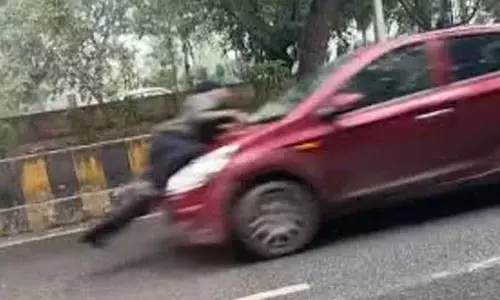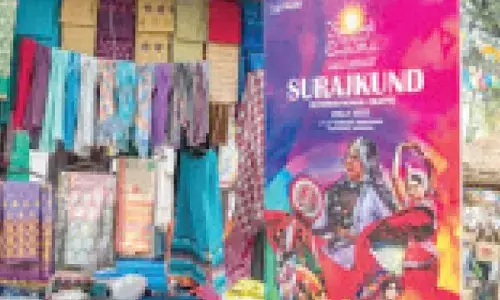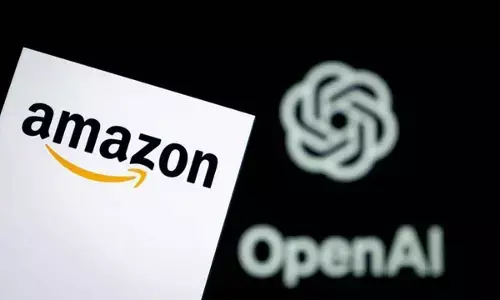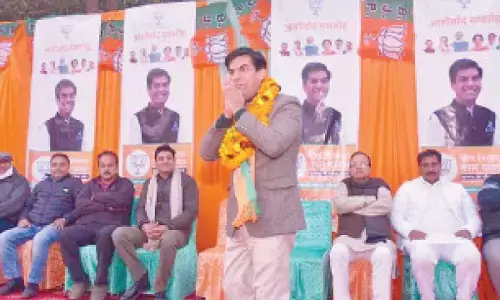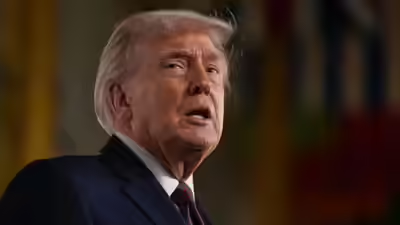Poll code needs easing in case of lengthy schedule
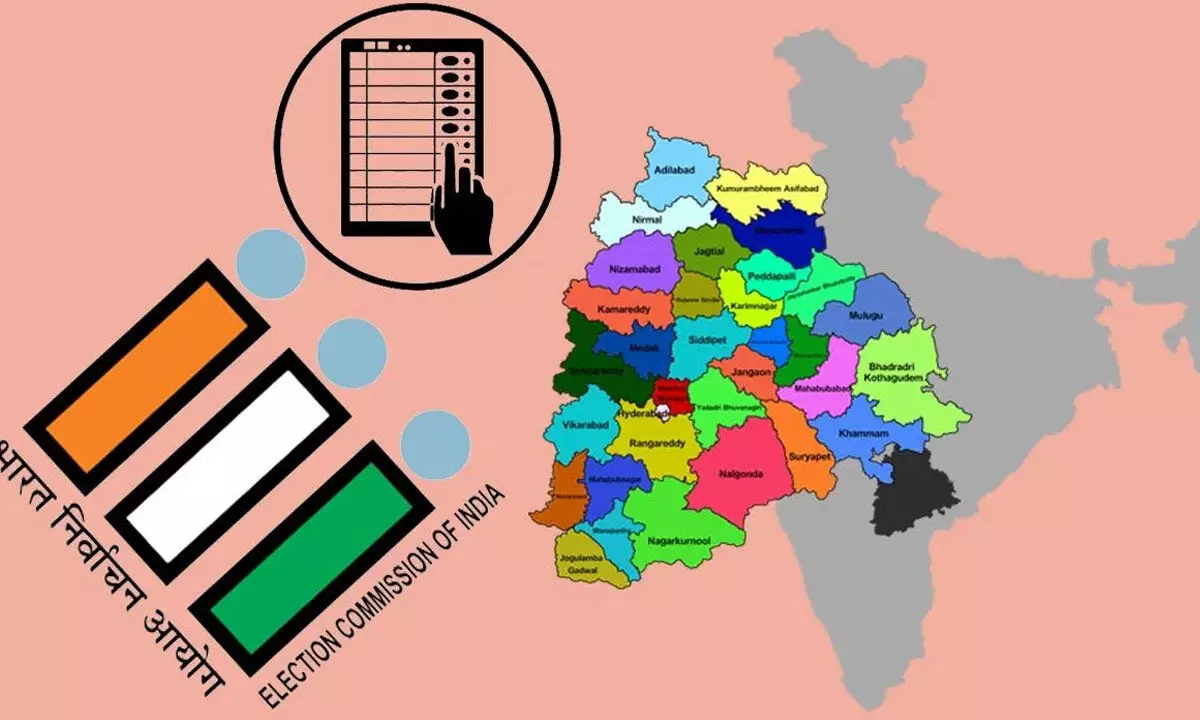
Consequent to the announcement of a lengthy election schedule for Telangana State Assembly polls by Election Commission (ECI) of India, the Chief Electoral Officer (CEO) of the State declared that the Model Code of Conduct (MCC) has come into force with immediate effect
Consequent to the announcement of a lengthy election schedule for Telangana State Assembly polls by Election Commission (ECI) of India, the Chief Electoral Officer (CEO) of the State declared that the Model Code of Conduct (MCC) has come into force with immediate effect. Visible effect of MCC, like random and or frequent searches of vehicles, confiscation of transportation of cash or kind in excess of permitted by law including gold or liquor etc., is significantly felt by offenders and occasionally by genuine public.
Flying squads and video teams have been querying and quizzing people who are caught, for details of seized kind or cash. This kind of an accepted procedure of late, and precisely, ever since money and material started playing key role in deciding the fate of contestants in polls, has become a necessity. But the question frequently asked is, whether these restrictions on the name of MCC, were 100% successful either in the past or would be in future. Details of individuals caught along with the value and also the end result is seldom displayed in public domain. In this regard, the concern expressed by ‘Forum for Good Governance’ is significant.
Helpline with Number 1950 to be operational 24X7 for lodging complaints, ‘Integrated Expenditure Monitoring Software’ to correlate expenditure on elections, Media Certification and Monitoring Committees (MCMCs) for certifying advertisements etc. are new additions by ECI to strengthen MCC. Political Parties and Media Organisations will have to follow this certification process. There is no dispute with the concepts and ideas that will go a long way in enthusing and giving confidence to voters, as long as these are strictly adhered in letter and spirit, treating all as equals.
ECI will also be using C-Vigil Mobile App, Planning Portal, National Grievances Services (NGS) Portal, ENCORE, Service Voter Portal, Electronically Transmitted Postal Ballot System (ETPBS), EVM Management System, Webcasting, Observers Portal, and Polling Personnel Randomization Software (PPRS) to check violation of Code. Telangana Government as a follow-up, constituted the ‘MCC Screening Committee’ with Chief Secretary as Chairperson, as advised by the ECI, to examine each proposal relating to regulation and enforcement of MCC during election time, and clear them, before forwarding to ECI, through Telangana CEO.
Within two days of announcement of the poll schedule and MCC, the ECI considered to be unprecedented and extraordinary, transferred three Police Commissioners, four District Collectors and several senior officers, directing them to immediately hand over charge to their immediate juniors. Later, as instructed by ECI, the State Government sent panel of three names to replace each transferred officer. The process was followed. Though, the reasons were not explicitly known for their transfers, media reports indicated that, many of them were getting ‘sandwiched’ between state and central governments while discharging their duties with commitment, and became ‘soft targets’ for politicians to complain against them, for the fault of ‘Sincerely Implementing State Government Schemes’ and accomplishing targets.
‘Unfolding Indian Elections-Journey of the living democracy,’ a book published by ECI in January 2017, documented several interesting anecdotes on Indian Elections. Spending money or buying votes was an anathema in the first general elections held during 1951-52, which Global Community witnessed with great interest. Some voters even regarded ballot boxes as objects of worship by dropping flowers.
Steadily, election abuses have become a characteristic feature. Reason for huge expenditure and election abuses are basically attributed to lengthy prolonged election and electioneering process, like the ensuing Telangana Assembly Elections, stretching for more than 50 days. Long-lasting election process commences with announcing schedule, almost a month before ‘Notification Date’ followed by MCC, which at times prohibits carrying developmental and welfare programs, except with prior permission, Political parties announcing candidates followed by nominations and submitting B-forms to Returning Officers, scrutiny, withdrawals, campaign, voting, counting, announcement of results etc. This propels to incur exorbitant expenditure by political parties and candidates, often multiple times over and above mandated by the ECI. These days of proliferation of electronic media, candidates and parties can make use of them to reach the voter, and in which case, if the campaign time is cut short and reduced substantially, then situation is likely to improve. Direct contact with voters during elections to be shortened to the maximum possible extent.
Model Code of Conduct, a ‘Necessary Evil’, is unfortunately like the German adage that, ‘One’s freedom starts where others’ nose ends.’ No one has any clue where, when, and how it begins and then comes to a full stop. In an unending and incessant process of Indian electoral system that goes on for several days often, the question generally asked is, why there be a restriction on common man, even occasionally, and also on democratically elected governments? Random searches on doubtful persons, may be a continuous process, not just during elections only.
It would also be ideal that until the lengthy election process is completed and until the new government is formed, the duly elected government in office shall be vested with same powers as was before, to discharge its responsibilities and constitutional obligations, to continue with all ongoing schemes without any deterrents. Constitution, neither explicitly nor implicitly made any mention regarding imposing restrictions through MCC. In a democratic polity for continuity of good governance, for the welfare of weaker sections and downtrodden, instead of limitations, convention of self-discipline may be ideal.
While this is so, taking advantage of MCC, at times we see some trivial complaints are lodged with ECI or CEO, often for cheap publicity. For instance, the complaint filed by Congress Party against CM KCR and BRS President, that, he used Pragathi Bhavan for political purposes by distributing B-Forms to some candidates, in violation of MCC sounds ridiculous!!! May be such complaints need to be ignored and not entertained. If someone complains that, CM is reading political and election related news in daily papers in Pragathi Bhavan or watching TV violating MCC should it be entertained!!!
Typically, ahead of elections in five states, the Central government hiked DA by 4% for its employees and also announced to pay 78 days of salaries as bonus for non-gazetted railway staff. Does this construe violation of MCC because this benefits Central Government Employees in states where elections are due!!! Similarly complaining to EC that a BJP Leader is appointed as Governor!!!
Against this background, it is high time that the whole process is modified through conscious electoral reforms. Unless an IT-enabled technology solution in the form of ‘Anytime, Anywhere Voting’ is introduced by the ECI, moving from the EVM form of voting, reducing steeply the entire election process, and cutting short the campaign time considerably or even to zero, survival of democracy may be at stake. Instead of earmarked booth, voter should have the choice to vote anytime, anywhere, even outside the constituency, district, and state. A ‘Permanent Social Security Number Card’ may be designed and perfectly programmed by ECI in such a way that, except the voter no one can use it. And the voter too can use it only once in a particular election. Voters on inserting the card, in a machine like the one used by Banks, the ballot connected to the voter’s constituency should appear irrespective of wherever they vote. Cards also should be programmed in such a way that, other than the voter, and that too only after inserting the card, none will be able to enter the room. When by using a credit or debit card from anywhere, anytime money can be withdrawn or deposited, including abroad, why isn't ‘Anytime, Anywhere Voting’ possible on similar lines?
(Writer is Chief Public Relations Officer to the Chief Minister, Telangana)









